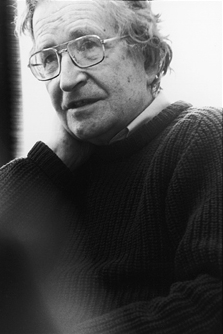Travis Taborek
Staff Writer
Noam Chomsky can be described in many ways by different people. A dissident. A rabble-rouser. A malcontent. He has even, oddly enough, been thought of as one of the most brilliant and influential minds of the 20th century.
Say of him what you like, but grant him one thing: he is not a man known to mince his words.
Chomsky, a Professor Emeritus of linguistics at the Massachusetts Institute of Technology, is known for his contributions in the field of structural linguistics, which include the Chomsky hierarchy of grammar and the theory of universal grammar. The professor is also a controversial political commentator and an outspoken critic of state capitalism, American foreign policy, neoliberal global economic institutions such as the World Bank, and the mainstream media. He has provided intellectual leadership and inspiration to activist groups worldwide.
Last Friday, Feb. 28, Chomsky was invited to give a lecture at the Lobero Theatre in downtown Santa Barbara by the Nuclear Age Peace Foundation, as part of their annual Frank K. Kelly Lecture on Humanity’s Future series. The lecture, entitled “Secuirty and State Policy,” was broadcasted live by KCSB on 91.9 FM as well as on their website.
After an introduction by David Krieger, the President of the Nuclear Age Peace Foundation, Chomsky prefaced his lecture by questioning one of the central principles of international relations theory: that the state exists to protect public security and well-being.
“And the preposition seems plausible, almost self-evident, until you begin to look more closely and ask the question ‘security for whom?’” said Chomsky. “For the general population, for state power itself, for dominant domestic constituencies, depending on what we mean, the credibility of the proposition arranges from very high to negligible.”
Chomsky used this idea as a starting point to discuss many of the pertinent issues of the day, including elements of the War on Terror like the drone strike campaign carried out under the Obama administration as well as the prospect of nuclear warfare and environmental degradation. He cited numerous historical examples that illustrated the extent to which the U.S. government goes out of its way to hide its agenda from the American public.
In particular, he made a point to emphasize that the drone strike campaign in Pakistan is only serving to radicalize the population and drive and add the surge of terrorist recruitment. Using this point, Chomsky painted a more general picture that the United States is widely and increasingly feared by the rest of the world as a threat to global security and world peace.
“What Americans are supposed to believe, to quote President Obama, is that for generations, the United States of America has played a unique role as an anchor of global security and as an advocate of human freedom,” said Chomsky. “That’s what we’re supposed to believe, not what the world thinks.”
The day after, Chomsky gave another lecture and Q&A panel at Pollock Theater, in which he discussed topics ranging from the Syrian civil war, deportations of undocumented immigrants, the Israel-Palestine conflict, and the importance of whistleblowing on government programs.
Chomsky concluded by emphasizing the importance of collective action in achieving social justice goals.
“You can overcome this,” he said. “This isn’t like fighting the secret police. You don’t get thrown into prisons for getting people to understand these things. This is an opportunity for real organizing work which can be done.”
Photo Courtesy of John Soares











